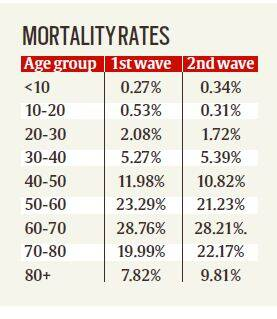Reasons for Rising Covid-19 Infections: Second Wave
Why in News
The ongoing second wave of Covid-19 infections has shaken the country and is more devastating than the first wave.
- The rise in case numbers has been exponential in the second wave.
Key Points
- Protocol Fatigue:
- When cases started declining, people just broke out of the protocol of wearing a face mask, washing hands regularly and maintaining social-physical distance.
- Gatherings began becoming large particularly January 2021 onwards.
- Rules were relaxed. Penalties were not enforced. The pattern was seen across the country allowing the novel coronavirus to create a second and possibly stronger wave.
- When cases started declining, people just broke out of the protocol of wearing a face mask, washing hands regularly and maintaining social-physical distance.
- Mixed Signal from Government:
- The queues outside polling booths and gatherings at the election rallies of all the parties defied Covid-19 protocol. This sent a confusing message to the public and also the grassroots-level functionaries of the government. It weakened the vigil against the pandemic.
- Urban Mobility:
- India has recorded over 1.2 crore cases of Covid-19 yet the pandemic is still mostly concentrated around cities, especially the bigger cities. These cities have greater mobility giving more opportunities for the virus to spread from one person to another when the guard is lowered.
- Containment Zones:
- In the current wave, the marking of the containment zone has been less strict. In cities, the government has asked civil authorities to adopt micro-containment, with perhaps just a floor or a house defined as a containment zone.
- Earlier, an entire apartment or area would be made a containment zone, reducing the chances of transmission of the virus.
- In the current wave, the marking of the containment zone has been less strict. In cities, the government has asked civil authorities to adopt micro-containment, with perhaps just a floor or a house defined as a containment zone.
- Mutations:
- Besides the human factors, the evolution of coronavirus is among the major reasons for the second wave. Scientists have detected numerous mutations in the SARS-CoV-2, the coronavirus that causes Covid-19. Some of these mutations have produced what they call is Variants of Concern (VOCs).
- India has reported such VOCs from several states including the worst-impacted ones by the second wave of Covid-19 pandemic.
- The L452R mutation found in the variant B1.671, first detected in India, too has been associated with increased infectivity.
- Besides the human factors, the evolution of coronavirus is among the major reasons for the second wave. Scientists have detected numerous mutations in the SARS-CoV-2, the coronavirus that causes Covid-19. Some of these mutations have produced what they call is Variants of Concern (VOCs).
Variants of Concern
- These are variants for which there is evidence of an increase in transmissibility, more severe disease (increased hospitalizations or deaths), significant reduction in neutralization by antibodies generated during previous infection or vaccination, reduced effectiveness of treatments or vaccines, or diagnostic detection failures.
- Increased Testing:
- Increased testing is another reason why India is detecting more cases in the second wave of the Covid-19 pandemic.
- The sero-surveys have shown that India had greater Covid-19 exposure than revealed through confirmed cases of coronavirus infection on the basis of laboratory tests.
- Earlier people were reluctant to go for Covid-19 tests but now easier availability of Covid-19 testing, improved disease-management in hospitals and rollout of Covid-19 vaccination programme has made people more confident about opting for the test.
- Asymptomatic Persons:
- Asymptomatic (showing no symptoms) person, who carries the virus, would have spread the infection. In India, 80-85% of the population are asymptomatic.
- Inadequate Health Infrastructure:
- India also failed to seize the opportunity to augment its healthcare infrastructure and vaccinate aggressively.
- For Example: Oxygen shortage and lack of beds in Hospitals.
- India also failed to seize the opportunity to augment its healthcare infrastructure and vaccinate aggressively.
Way Forward
- There are only two ways of getting immunity from the virus, one is getting infected, and the other is via a vaccine therefore it is important to fast track the vaccine programme across the country, but testing is equally important.
- The number of tests must go up again and contact tracing, ideally 20 persons for every case, should be taken up intently.
- There is a need for a renewed emphasis on following safety protocols. Draconian total lockdowns are no longer necessary. However, there is also need to formulate District Action Plans with a focus on mapping of cases, reviewing of ward/block wise indicators, 24x7 emergency operations centre, incident command system area specific rapid response team and timely sharing of information.
